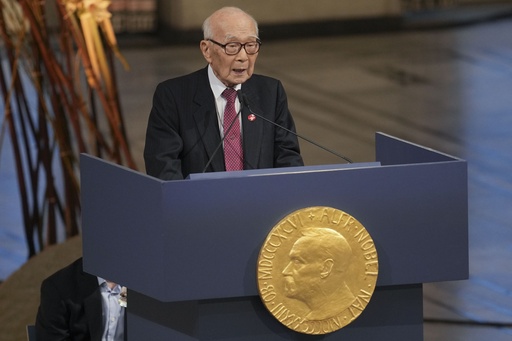OSLO, Norway — A 92-year-old survivor of the atomic bombing of Nagasaki recounted his harrowing experiences from 1945 during the acceptance of the Nobel Peace Prize on behalf of his organization on Tuesday. His vivid memories included the devastating aftermath of the bombing, which left him witnessing the burned remains of both family and friends amidst the destruction of his hometown.
The Nobel Prize was awarded to Nihon Hidankyo, a grassroots movement comprising survivors of the atomic bombings in Japan. For nearly seven decades, the organization has tirelessly campaigned to uphold a taboo against the use of nuclear weapons, which have proliferated significantly in both capability and numbers since they were first employed by the United States in Nagasaki and Hiroshima in World War II.
The bombings, which contributed to Japan’s surrender to the Allies, resulted in an estimated 210,000 deaths by the close of 1945, while the ultimate toll from radiation exposure remains likely much higher. As the survivors age, fears are growing that the longstanding taboo against nuclear warfare is beginning to erode. Terumi Tanaka, the elderly survivor who shared his experiences during the Nobel lecture held at Oslo’s City Hall, expressed deep concern over this trend in front of an audience that included members of the Norwegian royal family.
“The nuclear superpower Russia threatens to use nuclear weapons in its war against Ukraine, while a cabinet member in Israel, amid ongoing assaults on Gaza, has even mentioned the potential for nuclear weapon usage,” Tanaka remarked. “It brings me immense sorrow and frustration to see the nuclear taboo coming under threat.”
This apprehension was pivotal in the decision of the Norwegian Nobel Committee to grant this year’s prestigious award to the Japanese organization, which has been recognized for its consistent advocacy in nuclear non-proliferation over the years.
Jørgen Watne Frydnes, the committee’s chair, underscored in his introduction that it remains crucial to heed the testimony of survivors, especially as nuclear threats escalate. “The nine nations possessing nuclear arms — the United States, Russia, China, France, the United Kingdom, India, Pakistan, Israel, and North Korea — currently show little interest in disarmament or arms control,” Frydnes stated. “Instead, they are focused on modernizing and expanding their nuclear capacities.”
He urged the five nuclear-armed states that are signatories to the Treaty on the Non-Proliferation of Nuclear Weapons — the U.S., Russia, China, France, and the U.K. — to honor their treaty commitments, calling for other nations to ratify it as well. “To imagine that our society can endure in an environment where global safety relies on nuclear arms is overly simplistic,” Frydnes added. “We cannot accept a world that acts as a prison, anticipating our collective destruction.”
During his speech, Tanaka elaborated on the morning of August 9, 1945, when Nagasaki was bombed, three days after Hiroshima suffered a similar fate. He recounted hearing the drone of a bomber aircraft overhead, followed by an overwhelming blinding light, culminating in a powerful shockwave. In the days that followed, he and his mother ventured into the wreckage to search for family members living near the blast’s epicenter.
Tanaka described the harrowing scene of countless individuals — gravely injured and scorched — who lay completely abandoned and without medical care. He recounted a haunting emotional numbness that enveloped him as he painstakingly made his way toward his goal. He ultimately discovered multiple family members dead: a charred aunt, her grandson, an almost lifeless grandfather suffering from severe burns, and another aunt who tragically perished just moments before his arrival. In total, five relatives lost their lives due to the bombing.
He articulated a pressing mission for the survivors to leverage their experiences in a bid to abolish nuclear arms for humanity’s sake and seek restitution from the Japanese government, which instigated the war. “I sincerely hope that the conviction that nuclear weapons cannot — and must not — coexist with humanity will firmly resonate among the populations of nuclear-armed nations and their allies, becoming a catalyst for change in their governments’ nuclear policies,” he stated.


